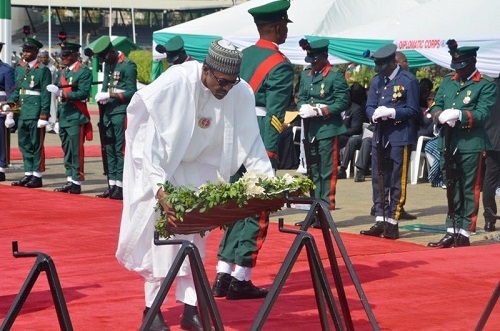This post has already been read 3205 times!
By Yemi Mapaderun
January 15 of every year is commemorated as the Armed Forces Remembrance Day in Nigeria. It is a day dedicated to acknowledge and appreciate the supreme sacrifice paid by members of the Nigerian Armed Forces in their quest and resolve to protect and preserve the territorial integrity of Africa’s most populous nation and the global capital of the black race.
This year’s celebration is unique for a number of reasons. First, it coincides with a period when there is resurgence in the activities of the Boko Haram terrorist group in the North-Eastern part of Nigeria; a resurgence that has inflicted considerable casualty on the Nigerian military in recent times.
Second, it is coming at a time when the Nigerian military is almost stretched to the limit with her involvement in tackling other myriad of threats to our internal security such as banditry in the North-West and herdsmen killings in the North-Central.
Third, it is just a few weeks to the 2019 general elections with attendant security concerns and the controversy over the role of the military in addressing such concerns.
Besides, it is coming at a time of lingering lack of appreciation of the role and contributions of the military in fighting these national security threats by some local and international non-governmental organisations. For instance, Amnesty International has curiously accused the Nigerian Army authorities of human rights abuses in their counterinsurgency operations in the North-East.
The truth is that such reports may be a result of lack of understanding of the changing dynamics in the definition of internal security and the role of the military in our internal security architecture. In today’s world, a country’s internal security has regional and at times, global dimensions and therefore, the involvement of the military in internal security is no longer an aberration. For example, the United States of America occasionally deploys the National Guard to quell certain unrest like the one witnessed in Georgia in 2018.
Therefore, it is important for every Nigerian to soberly reflect on the sacrifices made by our fallen heroes and our retired servicemen and women. This will go a long way in motivating those who are still in active service of their nation and an incentive for young Nigerians to offer to serve their fatherland in the various services.
Government, corporate bodies, non-governmental organisations and individuals must develop a culture of recognition and appreciation of not only our fallen heroes but also retired and serving military personnel as obtainable in other climes. We must go beyond the annual tokenism of laying wreaths in memory of the dead by honouring the living.
Something remarkable struck me in November 2014 while travelling on a Greyhound bus from Atlanta to Dallas in the US. There was a certain elderly black male passenger who always got preferential treatment on the bus. During stops, he always disembarked first unless he chose not to. On enquiry, I learnt that he was a military veteran and that it was the culture in the US to extend such courtesies to serving and retired military personnel. Other benefits including discount cards for purchases and a healthy pension are also extended to them.
Courtesies such as this should become part and parcel of our culture in Nigeria. The starting point is to smoothen the rough edges in military-civil relations. This frosty relationship emanated largely from the long years of military rule in our political governance leading to a situation of mutual distrust and fear. Sadly, the long years of military rule did not translate to better welfare for officers and men of the Armed Forces.
It is instructive to note that the current pension scheme of the military which was put in place by a civilian administration is a huge improvement on what obtained during the military era.
Furthermore, due to the increasing involvement of the military in internal security, there is the need to review their training regime to include skills and techniques for managing engagements with the civil populace. Similarly, our educational curriculum especially at the basic level, should include some military training. The combined effect of these is a better civil-military relationship.
As we mark the 2019 Remembrance Day, I recommend to the Federal Government that another Veterans’ Day should be instituted to honour ex-servicemen who are still living. Many developed nations of the world already have similar arrangements in place.
It is my considered opinion that mechanisms should be put in place to ensure that only passionate and committed people are recruited into the rank and file of the armed forces. The unemployment situation in Nigeria should not be allowed to result in the recruitment of characters who are only seeking for job but do not also possess the requisite qualities for military calling. This will enhance professionalism and discipline in the services.
Mr Yemi Mapaderun
Badagry, Lagos
yemimaps@yahoo.com



